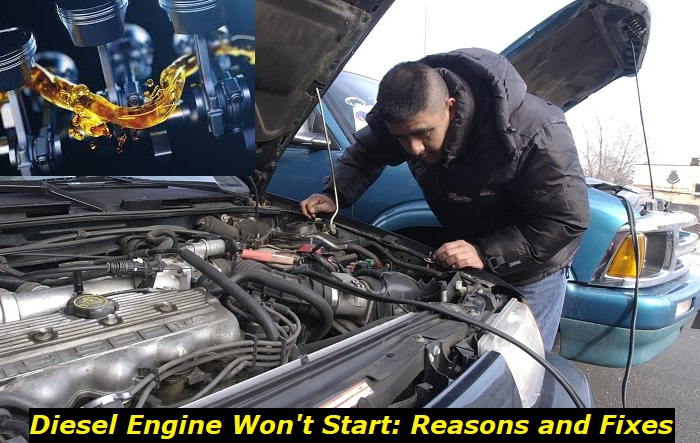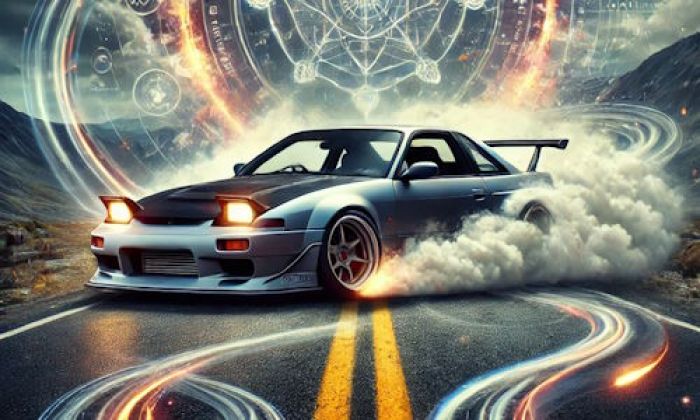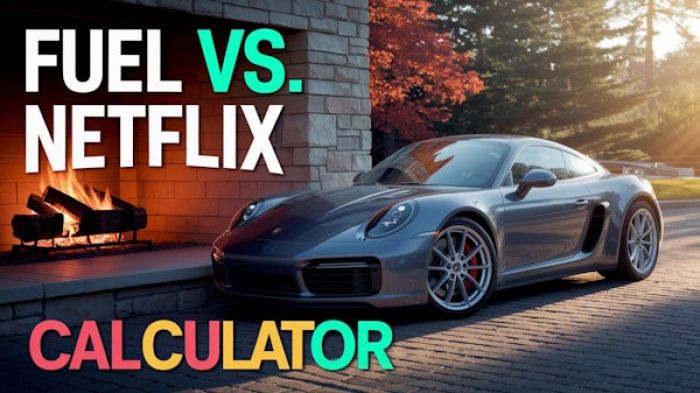A car engine that turns over or cranks but does not start is frustrating. The starter is working well, but the engine has other mechanical issues. In most cases, the engine lacks enough compression, fuel, or air intake to complete the starting process.
Crank-no-start problems highlights
- Level of urgency:High
- Can you drive?Obviously, no
- DIY inspection:Possible but complicated
- DIY repair:Mostly,impossible
- Price for repair:$350 - $800
- Common Reasons:No spark, no fuel, no air, battery issues, starter problems, electronics
- Ways to fix:Inspect units that may cause this problem one by one

How Does a Diesel Engine Start?
When you turn on the ignition key, the diesel engine goes through a four-stroke process to start. The process requires enough compression, fuel, pressure, and air for the engine to start and keep running. Anything that disrupts the flow of the four things disrupts the starting process. Let us look at the four strokes before discussing the mechanical issues that may interfere with the process.
The first stroke involves sucking sufficient air into the combustion chamber. The piston goes down to create a vacuum in the cylinder. The intake valve opens to allow air to flow into the cylinder, causing it to swirl. The air and fuel mixture is necessary for combustion and ignition. The intake stroke continues until the piston reaches the bottom dead end, causing the intake valve to close.
In the second stroke, the piston moves up again. The air is compressed, causing the pressure and temperature in the combustion chamber to increase. The injector pushes the diesel fuel out in a mist, which mixes with air to form a flammable vapor. The air-fuel mixture ignites when the piston is near the top dead center.
During the third stroke, the ignited vapor burns and forms gases. The combustion chamber's temperature and pressure increase as the volume of hot gases increases. The high pressure pushes the piston down, causing the engine to start. You will hear the normal cracking sound if the ignition process is successful.
The last stroke allows the burnt gases in the combustion chamber to escape through the exhaust valve. The chamber will be empty and ready to take in fresh air for the next ignition process.
What Causes a Diesel Engine to Turn Over but Not Start?
Any defect that affects any of the four strokes will affect the ignition process. The most common defects involve air intake, compression, fuel intake, and exhaustion. Your car may develop several issues simultaneously as internal parts wear out.
1. Air Intake Issues
The engine requires sufficient airflow to ignite and burn diesel fuel. Air from the outside goes through the air filter as the combustion chamber sucks it in. The filter traps any dirt, dust, or debris in the air. Consequently, the air filter is clogged over time. With a clogged filter, the engine cannot take in sufficient air to power the ignition process.
A vacuum leak may also lead to insufficient air in the combustion chamber. The valve must close completely for the air and fuel mixture to generate enough pressure to power the engine. Faulty valves and holes in the system will cause air to escape before the engine starts.
2. Fuel Flow Problems
If the engine is sucking in enough clean air into the combustion air, the starting problem may lie with the fuel flow. Sufficient fuel must flow into the tank to generate the required fuel pressure for the engine to start and keep running. Fuel pump issues lead to no or insufficient fuel in the engine.
The fuel pump should buzz or tick when you turn the ignition key depending on your car model. If you do not hear any sound, the fuel pump may be faulty, meaning that the fuel is not flowing into the engine. A damaged fuse, clogged fuel filter, or a defective injector may also cause fuel flow problems.
The fuel tank may also be empty even if the gauge shows you have enough fuel. The fuel gauge may be faulty and give a false reading. Before running other tests, you need to check the fuel tank and confirm that it has enough fuel. Replace the fuel gauge if it shows a different reading when the fuel tank is low or empty.
Another fuel problem that may cause your diesel engine to turn over without starting is contaminated fuel. Contamination may result from a dirty fuel tank or poor-quality fuel. If you buy fuel with water in it, the water settles at the bottom of the fuel tank. The system pushes the water first through the injection pump instead of diesel fuel.
3. Fuel Injection Issues
The fuel injection must be apt for the car engine to start and run correctly. The injection should not be too early or too late. The injection timing is different for all car engines. However, most diesel engines require fuel injection before the piston reaches the top dead center during the compression stroke.
An early fuel injection causes the diesel fuel to ignite prematurely. The starter cannot resist the pressure of the expanding burning gases. In such a situation, you will experience a kickback on the handle. A late injection may lead to black smoke in the exhaust pipe because the fuel does not burn properly.
Proper fuel injection requires a working injection pump and nozzle. The nozzle should fire from all holes and at high pressure. Hence, any faults with the nozzle or injection pump will affect the injection process.
4. Low Compression
Compression depends on the functionality of the piston, cylinder, and compression rings. All the parts must be working properly for the air to compress and heat up to a level that can power and run the engine. If you experience starting problems, the rings, piston, or cylinder may be worn out and require replacements.
The piston must also move fast enough to prevent air from seeping through the ring gaps. A faulty head gasket and valves also lead to low compression. The valves should shut completely so that the compressed air does not leak.
The valves cannot function well if they are worn out or damaged. Weak springs and bushings will also cause the valve to leave gaps, allowing air to escape. A detailed inspection by a qualified mechanic is necessary to identify and fix any issues with valves.
5. A Clogged Exhaust System
The exhaust system should allow the smoke and burnt gases to escape after the engine starts, allowing fresh air to come in for the next four-stroke cycle. A clogged system traps some gases in the cylinder, which means that the cylinder will take in less air in the next ignition stroke.
The cylinder will not take enough oxygen for combustion when you turn on the ignition. In addition, the cylinder will have contaminated air that does not ignite diesel fuel or generate enough compression to run the engine.
What to Do When Your Diesel Engine Is Turning Over but Not Starting
Your car may be stuck in one place if the engine fails to start. You can tow it to the nearest mechanic or fix the issues at home. Some of the issues are easy to fix, even without an expert. However, professional help is advisable if you are unsure about fixing the problem with the car manual. In addition, the repairs are inexpensive if you are consistent with car service.
1. Repair or Replace the Broken Parts
Faulty valves, head gasket, air filter, piston, compression rings, and cylinder need repair or replacement to avoid leaks and low compression. You may also need to install a new fuel pump or gauge if the starting problems are connected to low fuel intake. If you understand how the system works, you can inspect each part at a time to identify and replace the broken parts. If not, tow the car to the mechanic for a complete engine diagnosis.
2. Change the Diesel Fuel
If the problem persists after inspecting and fixing the broken parts, you may need to change the diesel fuel. Empty the fuel tank and refill it with quality fuel. You might need to change your gas station if the last refill was contaminated. Also, check if the fuel tank has any debris or rust that may contaminate new fuel.
Check if the fuel gauge is giving you the correct readings as the fuel level reduces. Replace it if it is faulty or inconsistent in readings.
3. Regular Service
Consistent car service helps you to diagnose all systems and replace damaged parts before they cause mechanical issues. For instance, replacing one or two parts may solve engine problems. However, the issues may recur if the parts are of low quality or worn out.
You can prevent some mechanical issues by identifying an expert mechanic to check your car regularly and advise you on the necessary repairs. In addition, you need to be proactive in fixing problems. If the engine fails to start once and then runs, fix the problem immediately before the engine stalls.
Conclusion
Your diesel car engine may turn over and fail to start if the air intake and fuel flow into the engine system are insufficient. Low compression and poor fuel injection can also interrupt the starting process.
The problems arise because of defective parts, including a faulty head gasket, defective valves, leaks in the cylinder, weak compression rings, and a clogged air filter. Replacing the broken internal parts and the diesel fuel often fixes the problem. A full engine diagnosis is advisable to avoid similar engine problems in the future.
About the authors
The CarAraC research team is composed of seasoned auto mechanics and automotive industry professionals, including individuals with advanced degrees and certifications in their field. Our team members boast prestigious credentials, reflecting their extensive knowledge and skills. These qualifications include: IMI: Institute of the Motor Industry, ASE-Certified Master Automobile Technicians; Coventry University, Graduate of MA in Automotive Journalism; Politecnico di Torino, Italy, MS Automotive Engineering; Ss. Cyril and Methodius University in Skopje, Mechanical University in Skopje; TOC Automotive College; DHA Suffa University, Department of Mechanical Engineering






Add comment